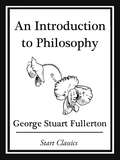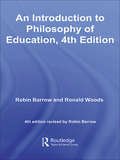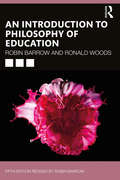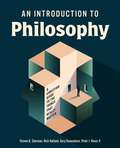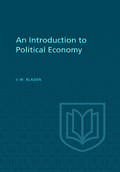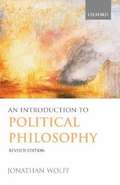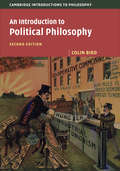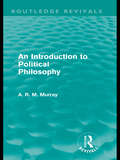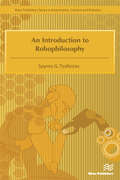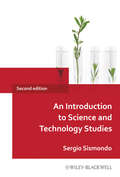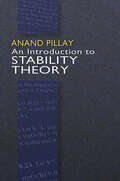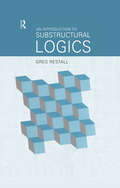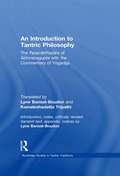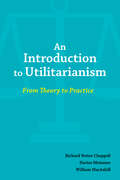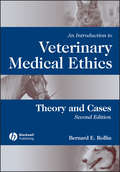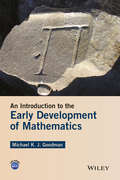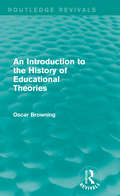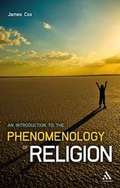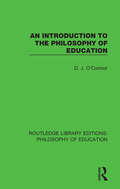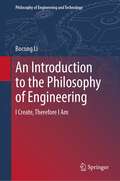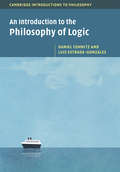- Table View
- List View
An Introduction to Philosophy
by George Stuart FullertonThis anthology is a thorough introduction to classic literature for those who have not yet experienced these literary masterworks. For those who have known and loved these works in the past, this is an invitation to reunite with old friends in a fresh new format. From Shakespeare s finesse to Oscar Wilde s wit, this unique collection brings together works as diverse and influential as The Pilgrim s Progress and Othello. As an anthology that invites readers to immerse themselves in the masterpieces of the literary giants, it is must-have addition to any library
An Introduction to Philosophy of Education
by Robin Barrow Ronald WoodsThis introductory text, now in its fourth edition, is a classic in its field. It shows, first and foremost, the importance of philosophy in educational debate and as a background to any practical activity such as teaching. What is involved in the idea of educating a person or the idea of educational success? What are the criteria for establishing the optimum balance between formal and informal teaching techniques? How trustworthy is educational research? In addition to these questions, which strike to the heart of the rationale for the educative process as a whole, the authors explore such concepts as culture, creativity, autonomy, indoctrination, needs, interests and learning by discovery. In this new updated edition, the authors draw on the latest research in genetics to argue that education is uniquely human and is essentially what develops us as humans. Resisting modern tendencies to equate knowledge with opinion, and value judgements with taste, this book leads the reader into the business of philosophising and champions the cause of reason in education.
An Introduction to Philosophy of Education
by Robin Barrow Ronald WoodsThis introductory text, now in its fifth edition, is a classic in its field. It shows, first and foremost, the importance of philosophy in educational debate and as a background to any practical activity such as teaching. What is involved in the idea of educating a person or the idea of educational success? What are the criteria for establishing the optimum balance between formal and informal teaching techniques? How trustworthy is educational research? In addition to these questions, which strike to the heart of the rationale for the educative process as a whole, the authors explore such concepts as culture, creativity, autonomy, indoctrination, needs, interests, and learning by discovery. Updates to this edition include new chapters on religious education and moral education, as well as questions for reflection at the end of each chapter.
An Introduction to Philosophy: A Christian Guide to the Things that Really Matter
by Steven B. Sherman Richard A. Holland Gary S. Osmundsen Peter J. RasorDesigned for students in Christian colleges and seminaries, An Introduction to Philosophy surveys the four main areas of philosophy - logic, metaphysics, epistemology, and ethics - in an accessible and engaging manner. Yet it also covers important topics sometimes left unaddressed in introductions, including:why philosophy matters in our daycritical thinking and intellectual virtuea brief history of philosophyphilosophical hermeneuticsthe relationship between philosophy, faith, and worldviewreligious epistemologybioethics, sexual ethics, other types of ethicsa Christian philosophy of lifeGrounded in the Christian intellectual tradition, each chapter in An Introduction to Philosophy includes student-friendly features such as chapter summaries, explanatory sidebars, reflection questions, vocabulary words and definitions, and suggestions for further reading. Professors and students will find it to be a broad and useful overview, perfect for undergraduate and seminary students alike.
An Introduction to Political Economy
by Vincent BladenNewly revised by the author (1956), this text-book for beginning students is also designed for general readers who want to know what economics is and how economists think. It analyses the size and composition of the wage-earner in modern industry, Canadian public policy in relation to combines, and the the social problems of the special problems of the Canadian wheat-growing and newsprint industries. "...an interesting, instructive, and valuable book full of essential information."
An Introduction to Political Philosophy
by Jonathan WolffThe revised edition of this highly successful text provides a clear and accessible introduction to some of the most important questions of political philosophy. Organized around major issues, Wolff provides the structure that beginners need, while also introducing some distinctive ideas of his own.
An Introduction to Political Philosophy (Cambridge Introductions to Philosophy)
by Colin BirdNow revised and updated and containing several entirely new chapters, this book provides a comprehensive introduction to political philosophy. It discusses historical and contemporary figures and covers a vast range of topics and debates, including immigration, war, national and global economics, the ethical and political implications of climate change, and the persistence of racial oppression and injustice. It also presents accessible, non-technical discussions of perfectionism, utilitarianism, theories of the social contract, and the Marxian tradition of social criticism. Real-life examples introduce students to ways of using philosophical reflection and debates, and open up new perspectives on politics and political issues. Throughout, this book challenges readers to think critically about political arguments and institutions that they might otherwise take for granted. It will be a vital and provocative resource for any student of philosophy or political science.
An Introduction to Political Philosophy (Routledge Revivals)
by A. R. MurrayFirst published in 1953, this seminal introduction to political philosophy is intended for both the student of political theory and for the general reader. After an introduction which explains the nature and purpose of philosophy, Dr Murray provides a critical examination of the principle theories advanced by political philosophers from Plato to Marx, paying special attention to contemporary issues. The book also makes an attempt to define the essential issues of philosophical significance in contemporary politics, with special reference to the conflict between political authority and individual rights, and to show how the different moral assumptions underlying authoritarian and democratic systems of government are ultimately based upon different theories of logic.
An Introduction to Probability and Inductive Logic
by Ian HackingThis is an introductory textbook on probability and induction written by one of the world's foremost philosophers of science. The book has been designed to offer maximal accessibility to the widest range of students (not only those majoring in philosophy) and assumes no formal training in elementary symbolic logic. It offers a comprehensive course covering all basic definitions of induction and probability, and considers such topics as decision theory, Bayesianism, frequency ideas, and the philosophical problem of induction. The key features of the book are: * A lively and vigorous prose style* Lucid and systematic organization and presentation of the ideas* Many practical applications* A rich supply of exercises drawing on examples from such fields as psychology, ecology, economics, bioethics, engineering, and political science* Numerous brief historical accounts of how fundamental ideas of probability and induction developed. * A full bibliography of further reading Although designed primarily for courses in philosophy, the book could certainly be read and enjoyed by those in the social sciences (particularly psychology, economics, political science and sociology) or medical sciences such as epidemiology seeking a reader-friendly account of the basic ideas of probability and induction. Ian Hacking is University Professor, University of Toronto. He is Fellow of the Royal Society of Canada, Fellow of the British Academy, and Fellow of the American Academy of Arts and Sciences. he is author of many books including five previous books with Cambridge (The Logic of Statistical Inference, Why Does Language Matter to Philosophy?, The Emergence of Probability, Representing and Intervening, and The Taming of Chance).
An Introduction to Robophilosophy Cognition, Intelligence, Autonomy, Consciousness, Conscience, and Ethics: Cognition, Intelligence, Autonomy, Consciousness, Conscience And Ethics (River Publishers Series In Automation, Control, And Robotics Is A Series Of Comprehensive Academic And Professional Books Which Focus On The Theory And Applications Of Automation, Control And Robotics. The Series Focuses On Topics Ranging From The Theory And Use Of Control Systems, Automation Engineering, Robotics And Intelligent Machines. Books Published In The Series Include Research Monographs,)
by Spyros G. TzafestasModern robots have arrived at a very matured state both in their mechanical / control aspects and their mental aspects. An Introduction to Robophilosophy explores the philosophical questions that arise in the development, creation, and use of mental – anthropomorphic and zoomorphic- robots that are capable of semiautonomous / autonomous operation, decision making and human-like action, being able to socially interact with humans and exhibit behavior similar to human beings or animals. Coverage first presents fundamental concepts, and an overview of philosophy, philosophy of science, and philosophy of technology. The six principal mental capabilities of modern robots, namely cognition, intelligence, autonomy, consciousness, conscience, and ethics are then studied from a philosophical point of view. They actually represent the product of technological embodiment of cognitive features to robots. Overall, readers are provided a consolidated thorough investigation of the philosophical aspects of these mental capabilities when embedded to robots. This book will serve as an ideal educational source in engineering and robotics courses as well as an introductory reference for researchers in the field of robotics, and it includes a rich bibliography.
An Introduction to Science and Technology Studies
by Sergio SismondoAn Introduction to Science and Technology Studies, Second Edition reflects the latest advances in the field while continuing to provide students with a road map to the complex interdisciplinary terrain of science and technology studies. Distinctive in its attention to both the underlying philosophical and sociological aspects of science and technologyExplores core topics such as realism and social construction, discourse and rhetoric, objectivity, and the public understanding of science Includes numerous empirical studies and illustrative examples to elucidate the topics discussedNow includes new material on political economies of scientific and technological knowledge, and democratizing technical decisionsOther features of the new edition include improved readability, updated references, chapter reorganization, and more material on medicine and technology
An Introduction to Stability Theory (Dover Books on Mathematics)
by Anand PillayThis introductory treatment covers the basic concepts and machinery of stability theory. Lemmas, corollaries, proofs, and notes assist readers in working through and understanding the material and applications. Full of examples, theorems, propositions, and problems, it is suitable for graduate students in logic and mathematics, professional mathematicians, and computer scientists. Chapter 1 introduces the notions of definable type, heir, and coheir. A discussion of stability and order follows, along with definitions of forking that follow the approach of Lascar and Poizat, plus a consideration of forking and the definability of types. Subsequent chapters examine superstability, dividing and ranks, the relation between types and sets of indiscernibles, and further properties of stable theories. The text concludes with proofs of the theorems of Morley and Baldwin-Lachlan and an extension of dimension theory that incorporates orthogonality of types in addition to regular types.
An Introduction to Substructural Logics
by Greg RestallThis book introduces an important group of logics that have come to be known under the umbrella term 'susbstructural'. Substructural logics have independently led to significant developments in philosophy, computing and linguistics. An Introduction to Substrucural Logics is the first book to systematically survey the new results and the significant impact that this class of logics has had on a wide range of fields.The following topics are covered:* Proof Theory* Propositional Structures* Frames* Decidability* CodaBoth students and professors of philosophy, computing, linguistics, and mathematics will find this to be an important addition to their reading.
An Introduction to Tantric Philosophy: The Paramarthasara of Abhinavagupta with the Commentary of Yogaraja (Routledge Studies in Tantric Traditions)
by Lyne Bansat-Boudon Kamalesha Datta TripathiThe Paramārthasāra, or ‘Essence of Ultimate Reality’, is a work of the Kashmirian polymath Abhinavagupta (tenth–eleventh centuries). It is a brief treatise in which the author outlines the doctrine of which he is a notable exponent, namely nondualistic Śaivism, which he designates in his works as the Trika, or ‘Triad’ of three principles: Śiva, Śakti and the embodied soul (nara). The main interest of the Paramārthasāra is not only that it serves as an introduction to the established doctrine of a tradition, but also advances the notion of jiv̄anmukti, ‘liberation in this life’, as its core theme. Further, it does not confine itself to an exposition of the doctrine as such but at times hints at a second sense lying beneath the evident sense, namely esoteric techniques and practices that are at the heart of the philosophical discourse. Its commentator, Yogarāja (eleventh century), excels in detecting and clarifying those various levels of meaning. An Introduction to Tantric Philosophy presents, along with a critically revised Sanskrit text, the first annotated English translation of both Abhinavagupta’s Paramārthasāra and Yogarāja’s commentary. This book will be of interest to Indologists, as well as to specialists and students of Religion, Tantric studies and Philosophy.
An Introduction to Utilitarianism: From Theory to Practice
by William MacAskill Prof. Richard Chappell Mr. Darius MeissnerAn Introduction to Utilitarianism: From Theory to Practice is a state-of-the-art text, simultaneously accessible to introductory students and informative for more advanced readers. Two key features set it apart. First, its comprehensive coverage of the arguments for and against utilitarianism is unparalleled. Second, it takes seriously the practical implications of utilitarianism for how we should live, with a particular emphasis on utilitarianism's impartial beneficence and its focus on effectiveness. Guided by the conviction that practical ethics is more about how best to use our limited time and resources than which victims to hit with trolleys in thought experiments, its practical upshots should prove amenable to utilitarians and non-utilitarians alike.
An Introduction to Veterinary Medical Ethics
by Bernard E. RollinOne of the most difficult issues that confronts veterinarians and staff today concerns the profession's obligation to the animal and the sometimes conflicting demands from clients, peers and society. The veterinarian's role has become more complex with new ethical challenges posed by issues such as growing public awareness regarding animal welfare, increasing economic value of companion animals, growth of veterinary specialization, experimentation with alternative and complementary medicine, and concern for pain management and mental well-being of animals. Written by an acknowledged pioneer in veterinary ethics, An Introduction to Veterinary Medical Ethics addresses the ethical challenges that veterinarians face daily as they seek to balance obligations to animal, client, peers, society and self. The book offers a highly readable and approachable introduction to the nature of ethical theory, reasoning and decision-making, and its practical application to veterinary medicine. Now with over 100 real-life veterinary case histories and analysis, this edition also includes new discussions of animal pain, distress and happiness, ethics of critical care, alternative medicine, legal status and value of animals, and Aesculapian authority. An Introduction to Veterinary Medical Ethics: Theory and Cases, Second Edition is recommended as essential reading for all veterinary students and practitioners, as well as those interested in general animal welfare. New edition from an acknowledged pioneer in veterinary ethics; Addresses ethical challenges that veterinary medicine, with over 100 real-life cases; Includes new discussion of legal status and value of animals, alternative medicine, Aesculapian authority, ethics and critical care, and animal pain, distress and happiness; Ideal for veterinary students and practitioners
An Introduction to the Early Development of Mathematics
by Michael K. GoodmanAn easy-to-read presentation of the early history of mathematics Engaging and accessible, An Introduction to the Early Development of Mathematics provides a captivating introduction to the history of ancient mathematics in early civilizations for a nontechnical audience. Written with practical applications in a variety of areas, the book utilizes the historical context of mathematics as a pedagogical tool to assist readers working through mathematical and historical topics. The book is divided into sections on significant early civilizations including Egypt, Babylonia, China, Greece, India, and the Islamic world. Beginning each chapter with a general historical overview of the civilized area, the author highlights the civilization’s mathematical techniques, number representations, accomplishments, challenges, and contributions to the mathematical world. Thoroughly class-tested, An Introduction to the Early Development of Mathematics features: Challenging exercises that lead readers to a deeper understanding of mathematics Numerous relevant examples and problem sets with detailed explanations of the processes and solutions at the end of each chapter Additional references on specific topics and keywords from history, archeology, religion, culture, and mathematics Examples of practical applications with step-by-step explanations of the mathematical concepts and equations through the lens of early mathematical problems A companion website that includes additional exercises An Introduction to the Early Development of Mathematics is an ideal textbook for undergraduate courses on the history of mathematics and a supplement for elementary and secondary education majors. The book is also an appropriate reference for professional and trade audiences interested in the history of mathematics. Michael K. J. Goodman is Adjunct Mathematics Instructor at Westchester Community College, where he teaches courses in the history of mathematics, contemporary mathematics, and algebra. He is also the owner and operator of The Learning Miracle, LLC, which provides academic tutoring and test preparation for both college and high school students.
An Introduction to the History of Educational Theories (Routledge Revivals)
by Oscar BrowningAn Introduction to the History of Educational Theories, first published in 1881, offers a comprehensive overview of the most notable approaches to education throughout Western history, from Athens and Rome to the Victorian public school. Exploring not only the still famous theories of Plato and Aristotle, this work also touches on techniques in education which are either no longer prevalent – Roman Oratory, the Jesuits – or in some cases were never widely adopted or appreciated: John Milton, for example. This title will be of value to those intrigued by the potential of past attitudes for present-day application, as well as to those unconvinced by contemporary approaches.
An Introduction to the Language of Mathematics
by Frédéric MynardThis is a textbook for an undergraduate mathematics major transition course from technique-based mathematics (such as Algebra and Calculus) to proof-based mathematics. It motivates the introduction of the formal language of logic and set theory and develops the basics with examples, exercises with solutions and exercises without. It then moves to a discussion of proof structure and basic proof techniques, including proofs by induction with extensive examples. An in-depth treatment of relations, particularly equivalence and order relations completes the exposition of the basic language of mathematics. The last chapter treats infinite cardinalities. An appendix gives some complement on induction and order, and another provides full solutions of the in-text exercises. The primary audience is undergraduate mathematics major, but independent readers interested in mathematics can also use the book for self-study.
An Introduction to the Phenomenology of Religion
by James L. CoxIn this revised edition, the author provides an easily accessible introduction to the phenomenology of religion, which he contends continues as a foundational method for the academic study of religion in the twenty-first century. After dealing with the problematic issue of defining religion, he describes the historical background to phenomenology by tracing its roots to developments in philosophy and the social sciences in the early twentieth century. The phenomenological method is then outlined as a step-by-step process, which includes a survey of the important classifications of religious behavior. The author concludes with a discussion of the place of the phenomenology of religion in the current academic climate and argues that it can be aligned with the growing scholarly interest in the cognitive science of religion.
An Introduction to the Philosophy of Art
by Richard EldridgeRichard Eldridge's compact survey of philosophical theories of the nature and significance of art draws on materials from classical and contemporary philosophy as well as literary theory and art criticism. Eldridge explores the representational, expressive, and formal dimensions of art, and argues that works of art present their subject matter as creations of enduring cognitive, moral, and social interest. His accessible study will be of interest to students and anyone interested in the relationship between thought and art.
An Introduction to the Philosophy of Education (Routledge Library Editions: Philosophy of Education #14)
by D. J. O'ConnorEducation, like every other important branch of knowledge, has its underlying philosophical problems. It is these problems and the attempts to solve them which together make up the philosophy of education. This book, first published in 1957, provides a simple explanation and illustration of what philosophy can (and cannot) do for educational thinking. This title will be of interest to students of the philosophy of education.
An Introduction to the Philosophy of Engineering: I Create, Therefore I Am (Philosophy of Engineering and Technology #39)
by Bocong LiThis book is the first academic work on the philosophy of engineering in China that reflects two decades of research. It puts forward a new thesis, namely that the core maxim in the philosophy of engineering is “I create, therefore I am,” which is radically different from the Cartesian maxim: “I think, therefore I am.” In addition, the book offers the first detailed portrait of the roots and evolution of the philosophy of engineering in China. The book begins by discussing the triptych thesis of science, technology and engineering, which argues that there are a number of important distinctions between the three, e.g. scientific activities are chiefly based on discovery, while technological activities center on invention, and engineering activities focus on creation. Considering the latest developments in the philosophy of engineering, the author also analyzes engineering communities, engineering practice and a micro–meso–macro framework. In subsequent chapters, the author separately analyzes the three stages of engineering activities: planning, operating and using artifacts. In the closing chapter, two views on the philosophy of engineering (as a new subdiscipline of philosophy and as a philosophy in its own right) are briefly explained.
An Introduction to the Philosophy of Language
by Michael MorrisIn this textbook, Michael Morris offers a critical introduction to the central issues of the philosophy of language. Each chapter focusses on one or two texts which have had a seminal influence on work in the subject, and uses these as a way of approaching both the central topics and the various traditions of dealing with them. Texts include classic writings by Frege, Russell, Kripke, Quine, Davidson, Austin, Grice and Wittgenstein. Theoretical jargon is kept to a minimum and is fully explained whenever it is introduced. The range of topics covered includes sense and reference, definite descriptions, proper names, natural-kind terms, de re and de dicto necessity, propositional attitudes, truth-theoretical approaches to meaning, radical interpretation, indeterminacy of translation, speech acts, intentional theories of meaning, and scepticism about meaning. The book will be invaluable to students and to all readers who are interested in the nature of linguistic meaning.
An Introduction to the Philosophy of Logic (Cambridge Introductions to Philosophy)
by Daniel Cohnitz Luis Estrada-GonzálezPhilosophy of logic is a fundamental part of philosophical study, and one which is increasingly recognized as being immensely important in relation to many issues in metaphysics, metametaphysics, epistemology, philosophy of mathematics, and philosophy of language. This textbook provides a comprehensive and accessible introduction to topics including the objectivity of logical inference rules and its relevance in discussions of epistemological relativism, the revived interest in logical pluralism, the question of logic's metaphysical neutrality, and the demarcation between logic and mathematics. Chapters in the book cover the state of the art in contemporary philosophy of logic, and allow students to understand the philosophical relevance of these debates without having to contend with complex technical arguments. This will be a major new resource for students working on logic, as well as for readers seeking a better understanding of philosophy of logic in its wider context.
